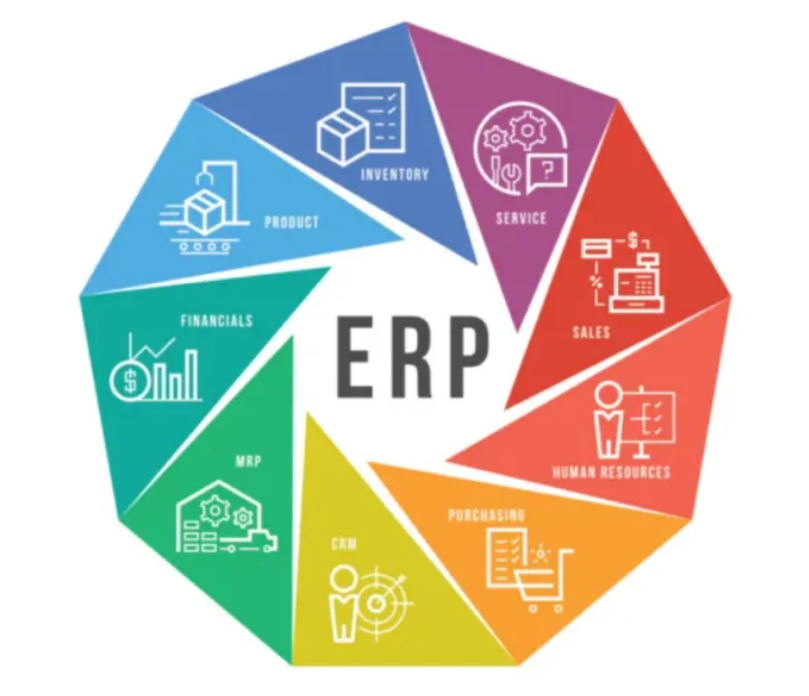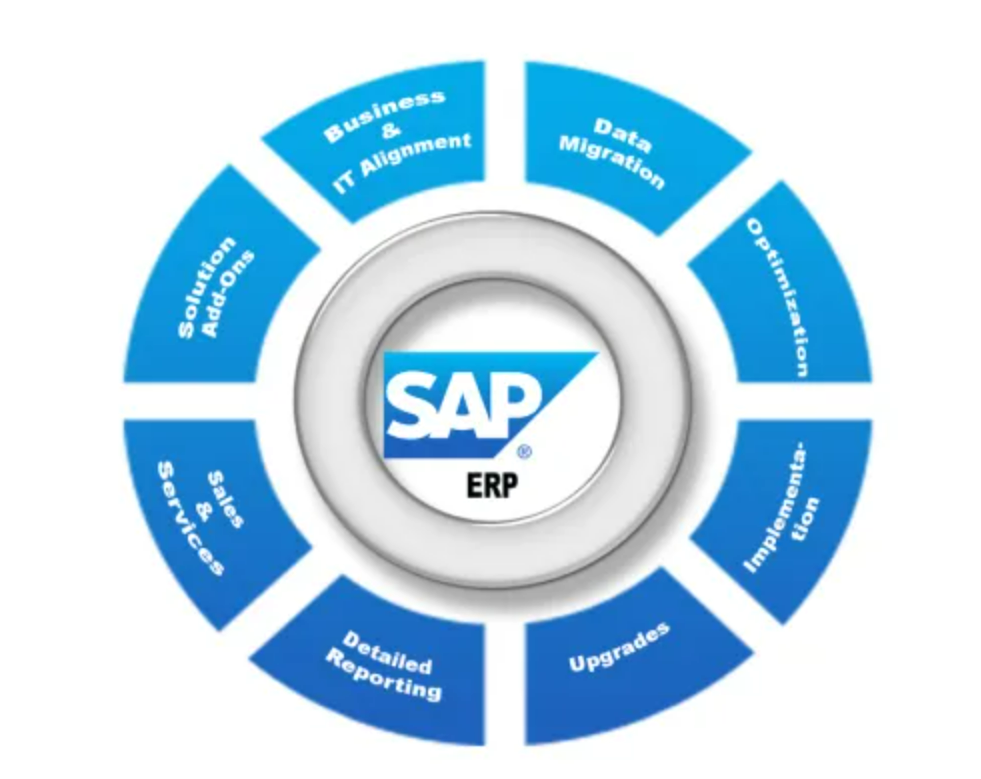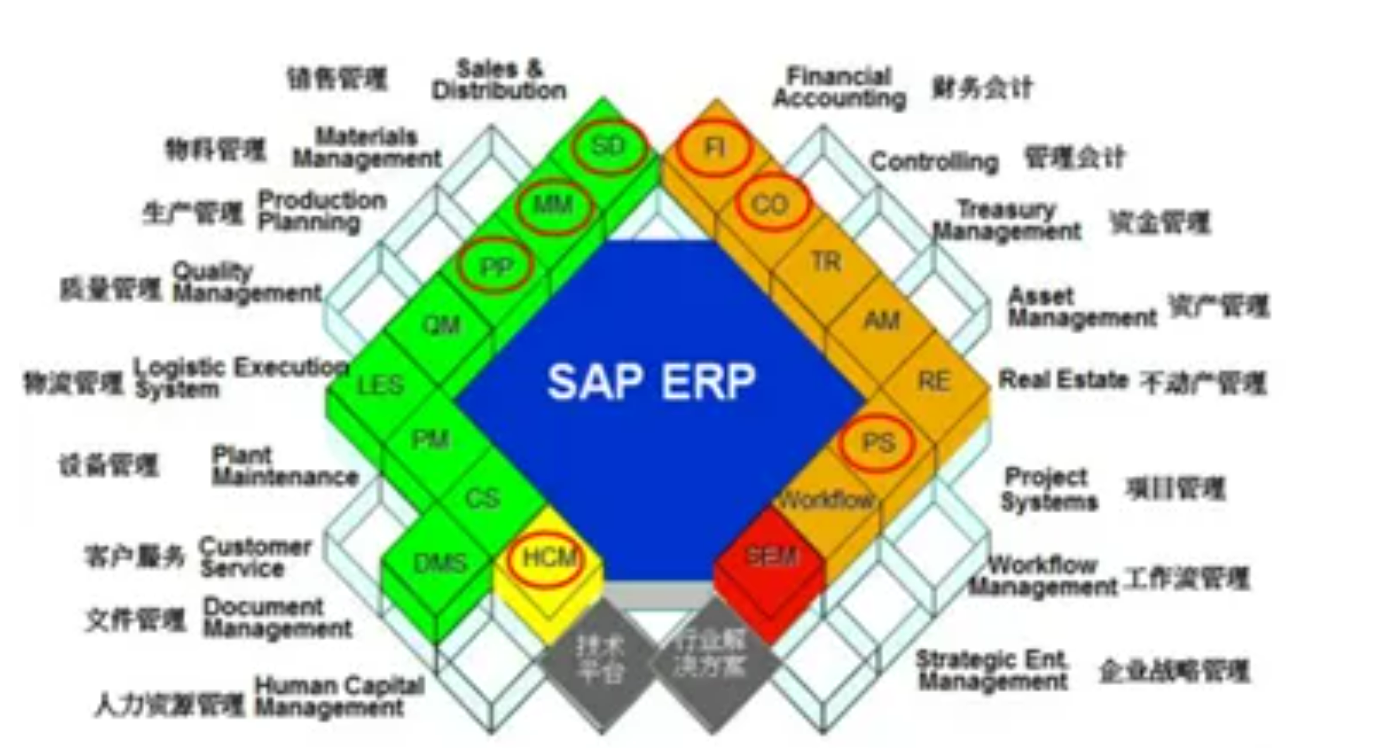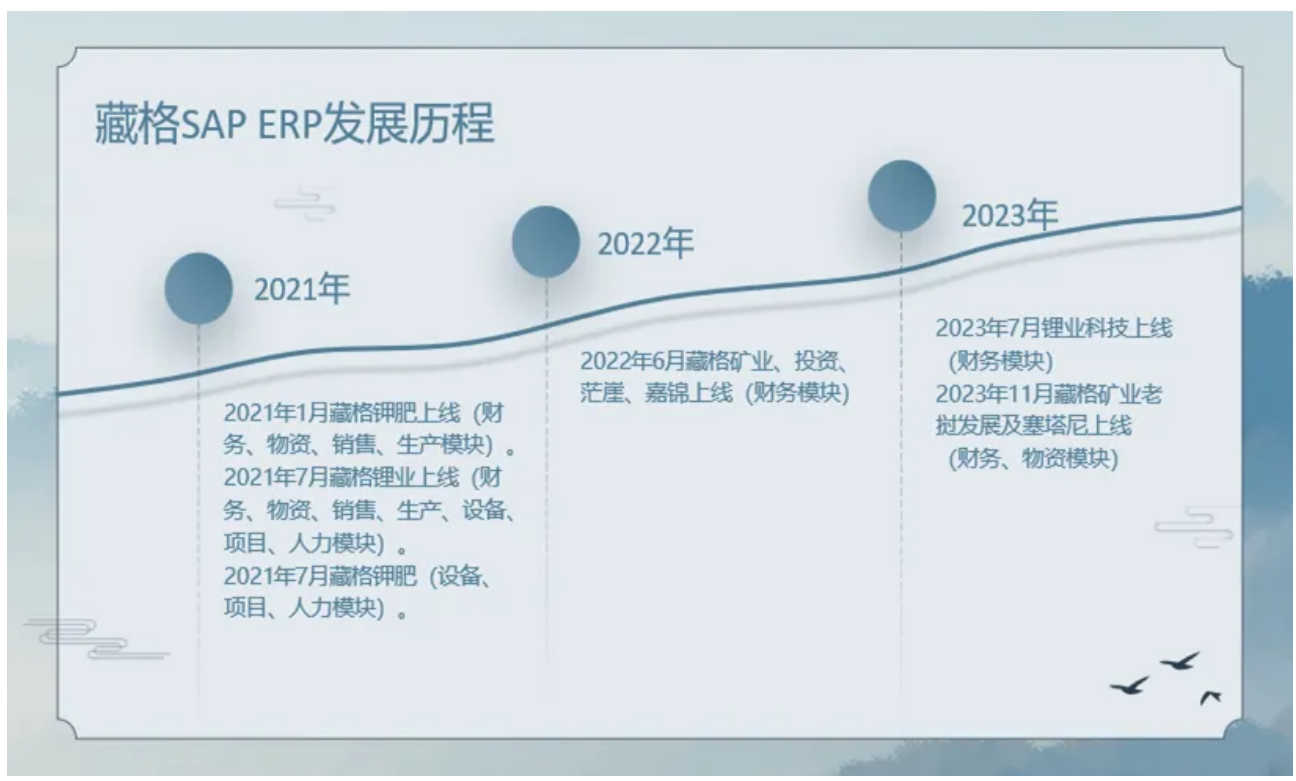2024-04-24
IT Department Brings You Closer to Zangge ERP
What is SAP ERP

Since the 14th Five-Year Plan, the Chinese government has increasingly supported the digital economy through policies and encouraged enterprises to undergo digital transformation. Along with the continuous development of Zangge Mining, the company actively responded to this national call by restructuring the IT Department in 2020 and initiating enterprise informatization. After exploring multiple directions in information technology over the years, the company ultimately chose ERP (Enterprise Resource Planning) system, a core enterprise resource management system, as the entry point for its informatization efforts.
When mentioning ERP, many may find it unfamiliar. ERP (Enterprise Resource Planning) is essentially an enterprise resource planning system—a highly integrated information system based on advanced management concepts, which reasonably integrates functions such as finance, distribution, manufacturing, and other business operations.
Is ERP merely a business system? We believe it is more importantly an advanced management philosophy—integrating internal and external resources of the enterprise. The software tightly integrates personnel, finance, materials, production, supply, and sales, as well as related logistics, information flow, capital flow, and management flow, achieving resource optimization and sharing. ERP provides a management platform for decision-making and operational guidance for executives and employees.
Regarding ERP systems, both domestic (such as Kingdee, Yonyou) and international solutions (SAP, Oracle, Microsoft) offer mature software. After a market analysis comparing functionality, technology, scalability, and industry applicability, the company ultimately chose SAP as its partner, implementing informatization based on SAP S/4 HANA ERP system.
SAP refers not only to an ERP software but also to the company itself—SAP SE. Founded in 1972 and headquartered in Germany, SAP has remained a leader in the ERP industry for over half a century. Currently, over 450,000 users across more than 190 countries use SAP ERP. Even giants like Oracle, Microsoft, or domestic ERP providers Kingdee and Yonyou cannot surpass SAP’s leading position in the ERP industry.

Why has SAP become an industry benchmark? Our department analyzed this in depth and concluded that its success lies in stable architecture, highly standardized and modular functions, and excellent product design thinking. SAP covers multiple modules needed for enterprise management—finance, cost control, asset management, etc.—with tight integration and information sharing. Finance-operation integration is SAP’s key feature compared to domestic ERP systems, enabling real-time integration of material transactions into financial documents. This reduces manual entry and allows finance staff to focus on cost control.
Potash and lithium operations are currently the company’s two core production bases, both process-driven manufacturing industries. Considering industry characteristics and business needs, SAP ERP’s five standard modules—Finance, Cost, Production, Procurement, and Sales—have been implemented at these two bases, while other subsidiaries have implemented the Finance module based on their business requirements.

Before SAP ERP implementation, business data mainly circulated via offline forms, which was time-consuming and inefficient, with finance and operations data not effectively integrated. After deployment, SAP ERP optimized business processes, enabling real-time sharing of personnel, finance, material, production, supply, and sales data. For inventory management, material in/out records are automatically reflected in financial vouchers, eliminating manual duplication and achieving true finance-operation integration. Cost allocation rules and material ledgers further automate accounting, accurately reflecting revenues and costs, reducing errors, and providing strong data support for business decisions.
The application of SAP ERP has broken information silos between departments, achieved finance-operation integration, and promoted real-time, efficient sharing of logistics, capital, and information flows within the company. While standardizing business processes, it has greatly improved employee efficiency and enhanced operational management.
Looking Ahead

Since the initial implementation of the SAP project, its stability, functionality, and strong business and technical support have been recognized by our IT and business teams, providing strong backing for rapid business growth over the past three years and laying the foundation for smooth collaboration.
The excellence of software lies not only in the software itself but also in the management philosophy it embodies. We summarize SAP’s outstanding management thinking as follows:
First, to gain a competitive advantage, modern enterprises cannot rely solely on internal resources. They must integrate all relevant parties—suppliers, manufacturers, distribution networks, customers—into a tight supply chain. Competition now occurs between supply chains, not individual companies, which we consider a core SAP management philosophy. Zangge’s business spans multiple regions, including Qinghai and Tibet domestically, and Vientiane in Laos internationally. Building an efficient global supply chain is critical. Future IT construction aims for internal coordination and integration with upstream and downstream partners to create a resilient supply chain, enhancing market competitiveness.
Second, another core SAP management philosophy integrates Lean Production and Agile Manufacturing. Lean Production relies on supply chain partnerships, while Agile Manufacturing leverages basic and short-term supply chains to maintain high-quality, diverse, and flexible products.
Supported by an efficient supply chain, we conduct refined management of production processes, improving efficiency, reducing costs, and creating value.
Third, SAP’s process design emphasizes advance planning and in-process control. The SAP planning system allows production, logistics, finance, and HR plans to be developed across the supply chain. Transaction processing simultaneously generates linked business and financial records, enabling in-process control and real-time decision-making, achieving true finance-operation integration. This is a key direction for Zangge to further enhance management—full-cycle, multi-perspective goal achievement from planning to execution, business to finance.
In summary, SAP ERP is an enterprise resource management system integrating management concepts, business processes, basic data, human and material resources, and IT infrastructure. Its core is supply chain-oriented management, leveraging client/server architecture, relational databases, object-oriented technology, network communication, and ERP management design.
Excellent enterprise management is always the foundation of success. How to adopt scientific management techniques, consolidate competitiveness, improve efficiency, and create value will remain our focus. Guided by Zangge’s strategic objectives, we will continue to explore SAP’s management philosophies and leverage SAP software to support our informatization efforts.
















 Reporting Hotline:+86-028-89992276
Reporting Hotline:+86-028-89992276 Reporting Email:
Reporting Email: Mailing Address:Audit and Supervision Office, CAG Mining Co., Ltd., 19th Floor, Building 2, No. 1199 North Section of Tianfu Avenue, Chengdu High-tech Zone, China (Sichuan) Pilot Free Trade Zone, 610041
Mailing Address:Audit and Supervision Office, CAG Mining Co., Ltd., 19th Floor, Building 2, No. 1199 North Section of Tianfu Avenue, Chengdu High-tech Zone, China (Sichuan) Pilot Free Trade Zone, 610041